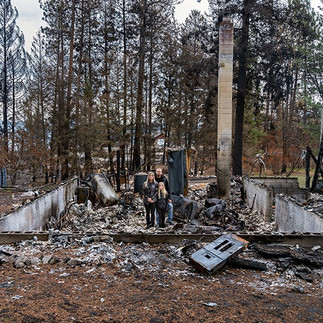How can photography capture climate? Mendel and Nelson in conversation.
- Bel Jacobs

- May 8, 2024
- 3 min read
Captions below.
Last October, award-winning photographer Gideon Mendel and Extinction Rebellion joined forces to stage a mobile exhibition outside Standard Chartered’s head office.
The exhibition, with protestors holding large prints of images of Mendel’s heartbreaking Burning World Project, was held to highlight the bank's funding of fossil fuels - as well as its disingenuous sponsorship of this year's Weather Photographer of the Year by The Royal Meteorological Society.
From Extinction Rebellion's press release: "Gideon Mendel’s photography bears stark witness to the suffering wreaked on communities and the widespread environmental destruction created by wildfires, which are occuring ever more frequently as global temperatures continue to rise, fuelled by the burning of fossil fuels."
On May 1st, against the backdrop of the prints from the Burning World project, Mendel sat in conversation with Zed Nelson in the Islington Climate Centre, where both award-winning photographers discussed the process of bearing witness to the impact of the climate and ecological emergencies and creating long term impactful work.
For the last sixteen years, Mendel has focused on capturing the human experience and physical impacts ofthe global climate emergency, with his Drowning World and Burning World projects weaving complex narrative threads to depict it. Showing catastrophic floods and the aftermath of wildfires Mendel takes us into the lives of the affected individuals as they navigate the devastation in their wake, and comprehend a profoundly altered landscape.
Proof and Portents trailer – Gideon Mendel: Fire / Flood is on now in Soho Photography Quarter. Courtesy of The Photographers Gallery.
One of the most poignant aspects of the imagery, Nelson pointed out, is that they feature people from, for example, Nigeria and Bangladesh and also those from the United States, emphasising that there are no boundaries to the impact of climate and ecological breakdown. “It was an effective way of putting everyone in the same boat and you see the details of their lives, or their poverty or their wealth that they may have had prior to this," said Nelson.
“We have to break away from this narrative of climate change affecting black and brown people, elsewhere,” agreed Mendel. “When I went to the floods in Germany in 2021, which killed 70 people, I remember people saying to me, ‘this doesn’t happen in Germany. This happens in Bangladesh or Africa.‘ It needed to be about shared vulnerability.”
“It seems as though, until that sinks, no one will do anything about it,” added Nelson. “That’s the most potent part of the project for me.”
The photographers went on to discuss the difficult process of photographing in places under extreme duress, how Mendel was donated items from the fires and what he plans to do with them and the people he had photographed.
Nelson specialises in long-term projects that explore contemporary society. He has published three books, Gun Nation, Love Me and A Portrait of Hackney, and been recognised by numerous photography awards, including the Visa d’Or (France), First Prize in the World Press Photo Competition (Netherlands), and the Alfred Eisenstaedt Award (USA). His latest film, ‘The Street’, focuses on one street in Hackney over four years - exploring runaway gentrification and change.
His latest work, The Anthropocene Illusion (2024) - on humanity's fractured relationship with nature and animals - will be published this year.
For further information, visit https://gideonmendel.com/ and https://www.zednelson.com/
Image 1: Rhonda Rossbach, Derek Briemand and Autumn Briemand, Killiney Beach, British Columbia, Canada. October 2021.
Image 2: Kathleen Fleming, Spring Drive, Spanish Hills, Boulder, Colorado, USA. March 2022
Image 3: Jenni Bruce, Upper Brogo, New South Wales, Australia. January 2020











Comments